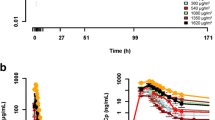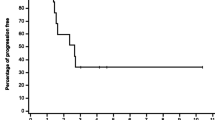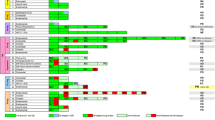Abstract.
Purpose: A phase I study of the antitumor antibiotic 7-cyanoquinocarcinol, DX-52-1, was conducted in patients with refractory solid malignancies. This study sought to determine the maximum tolerated dose and principal toxicities of this agent and to characterize its pharmacokinetic behavior. Methods: Patients were required to have adequate bone marrow, renal and hepatic function. DX-52-1 was administered by i.v. continuous infusion over a 6-h period each week for four consecutive weeks followed by a 2-week rest period, which constituted one cycle of treatment. Results: Initial dose levels were 3, 6, and 10 mg/m2. An intermediate dose level of 8 mg/m2 was added after acceptable toxicity was observed at the 6 mg/m2 dose level, but dose-limiting toxicities, including life-threatening ones, were seen at the 10 mg/m2 dose level in all three patients. The maximum tolerated dose (MTD) was subsequently determined to be 6 mg/m2. Because a clear pattern of toxicities was not initially evident, a larger than usual number of additional patients (16) were enrolled at the MTD to better distinguish toxicities due to the study drug from those secondary to the patients' underlying malignancies. Even at the MTD, the drug was poorly tolerated, with gastrointestinal toxicities (abdominal pain, nausea, vomiting and increased liver function tests) predominating and dose-limiting. Pharmacokinetic studies revealed that the mean maximum plasma concentration of DX-52-1 in patients evaluated at the MTD (138.8±59.3 ng/ml, n=19) was considerably lower than the concentrations required for cytostatic or cytotoxic activity against sensitive human tumor cell lines in vitro. Further, the weekly dose intensity of the most efficacious treatment schedule identified during in vivo antitumor efficacy studies was 60 times greater than the 6 mg/m2 weekly dose tolerated by cancer patients. None of the 33 patients participating in this study, including the 22 patients evaluated at the MTD, had any response to treatment. Conclusion: Given the poor tolerability, the inability to achieve drug levels necessary to inhibit in vitro or in vivo tumor growth, and the lack of any responses in our study, DX-52-1, as given by this schedule, does not appear to warrant further investigation in phase II studies.
Similar content being viewed by others
Author information
Authors and Affiliations
Additional information
Electronic Publication
Rights and permissions
About this article
Cite this article
Bunnell, C.A., Supko, J.G., Eder, J. et al. Phase I clinical trial of 7-cyanoquinocarcinol (DX-52-1) in adult patients with refractory solid malignancies. Cancer Chemother Pharmacol 48, 347–355 (2001). https://doi.org/10.1007/s002800100319
Received:
Accepted:
Published:
Issue Date:
DOI: https://doi.org/10.1007/s002800100319




